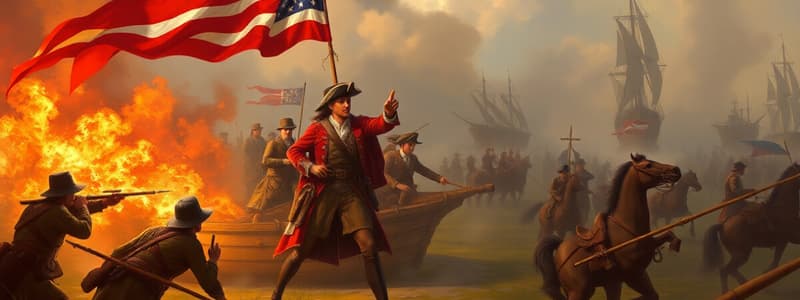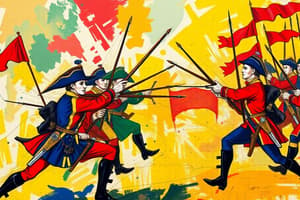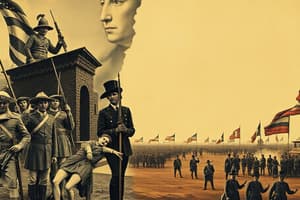Podcast
Questions and Answers
What were some weaknesses of the American army at the beginning of the war?
What were some weaknesses of the American army at the beginning of the war?
- Short on men (correct)
- Lack of experienced leadership
- Advanced weaponry
- Sufficient supplies
Which factor contributed to the American strengths at the start of the conflict?
Which factor contributed to the American strengths at the start of the conflict?
- Help from overseas (France) (correct)
- Advanced military tactics
- Overwhelming numbers
- Access to superior resources
What was one of the weaknesses of the British army at the beginning of the war?
What was one of the weaknesses of the British army at the beginning of the war?
- Superior naval power
- Access to immense resources
- Well-trained troops
- Distance between England and America (correct)
Why did many blacks join the Continental army during the war?
Why did many blacks join the Continental army during the war?
What was the significance of 'The Crisis' pamphlet written by Thomas Paine?
What was the significance of 'The Crisis' pamphlet written by Thomas Paine?
What battle is considered the turning point of the war?
What battle is considered the turning point of the war?
What strategy was adopted by Washington midway through the war?
What strategy was adopted by Washington midway through the war?
Why did the British decide to focus their efforts in the South?
Why did the British decide to focus their efforts in the South?
Which was not a reason for the fading hopes among American troops after the Battle of New York?
Which was not a reason for the fading hopes among American troops after the Battle of New York?
Which of the following was a significant consequence of the American victory at Saratoga?
Which of the following was a significant consequence of the American victory at Saratoga?
What characterized the American guerrilla strategies in the southern campaign?
What characterized the American guerrilla strategies in the southern campaign?
What was a central theme of Thomas Paine's pamphlet 'The Crisis'?
What was a central theme of Thomas Paine's pamphlet 'The Crisis'?
Which factor contributed to the British army's strengths at the beginning of the war?
Which factor contributed to the British army's strengths at the beginning of the war?
What was one of the American strengths that notably contributed during the initial phase of the war?
What was one of the American strengths that notably contributed during the initial phase of the war?
Which of the following was a disadvantage for the British in the war?
Which of the following was a disadvantage for the British in the war?
What tactic did George Washington adopt midway through the war?
What tactic did George Washington adopt midway through the war?
Which event directly followed the surprise attack at the Battle of Trenton?
Which event directly followed the surprise attack at the Battle of Trenton?
What was a reason for why the British shifted their military focus to the South?
What was a reason for why the British shifted their military focus to the South?
Flashcards are hidden until you start studying
Study Notes
American Strengths and Weaknesses
- The Americans were outmatched in terms of resources and training at the start of the war, lacking supplies and well-trained soldiers.
- However, they possessed strong patriotic motivation fueled by the desire for independence and were aided by foreign assistance, primarily from France.
- George Washington's leadership was a crucial asset, providing strategic direction and rallying the troops.
British Strengths and Weaknesses
- The British held a significant advantage in terms of manpower and proficiency, having a well-equipped and trained army.
- Their distance from America posed logistical challenges, hindering communication and supply lines.
- Additionally, the British struggled to garner public support in England for the war, facing internal dissent.
- The war was initially seen as a minor endeavor, and their leadership proved ineffective in achieving decisive victories.
Black Participation and the Shift in Slavery
- African Americans joined the Continental Army, motivated by the promise of freedom if they fought for the cause of independence.
- The war significantly impacted views on slavery, leading to gradual abolition efforts in Northern states at its conclusion.
Key Battles and Turning Points
- The Battle of New York resulted in a British victory, weakening American morale.
- Thomas Paine's pamphlet, "The Crisis," revitalized the troops' spirit, leading to the successful surprise attacks on Hessian forces at Trenton and British troops at Princeton, demonstrating the Americans' ability to fight back effectively.
- Washington shifted to a defensive strategy, focusing on guerilla tactics and attrition warfare to wear down the British forces.
- The Battle of Saratoga marked a turning point, leading to a decisive American victory and securing French alliance, significantly tipping the balance of power in favor of the Americans.
- The Battle of Monmouth resulted in an American victory, showcasing their growing strength and resilience.
The Southern Campaign
- The British decided to shift the focus of the war to the South, hoping to capitalize on perceived Loyalist support.
- The Americans employed guerilla warfare tactics, constantly harassing the British army and utilizing the terrain to their advantage.
- Nathanael Greene's strategic maneuvering led the British forces on an exhausting chase throughout the Southern states, exhausting their resources and weakening their resolve.
American Weaknesses at the Beginning of the War
- Lacked manpower
- Insufficiently trained soldiers
- Shortage of supplies: weapons, food, and ammunition
American Strengths at the Beginning of the War
- Strong sense of patriotism
- French support
- Effective leadership: George Washington
British Strengths at the Beginning of the War
- Larger army than the Americans
- Well-trained soldiers
- Well-stocked supplies
British Weaknesses at the Beginning of the War
- Distance between England and the colonies
- Difficulty convincing England of the war's importance
- Weak leadership
The Struggle for Freedom
- Black soldiers hoped for freedom by fighting for the Continental Army
- Northern states began to abolish slavery after the war
Key Battles and Turning Points
- The British won the Battle of New York, but American morale declined due to harsh conditions and troop desertions
- Thomas Paine's "The Crisis" rekindled the troops' fighting spirit, setting the stage for victories.
- Washington's surprise attack at Trenton during Christmas night, 1776, captured Hessian mercenaries and boosted American hope, demonstrating that the British could not simply rely on pardons or New York's capture to win.
- Washington changed his strategy to focus on defensive tactics
- The Battle of Saratoga, a decisive American victory, convinced France to become an ally.
- Although the Americans won the Battle of Monmouth, it marked a turning point.
Shift to the South
- The British decided to fight in the South, hoping for Loyalist support.
- American tactics involved guerrilla warfare and strategic maneuvering, depleting British military resources and morale.
Studying That Suits You
Use AI to generate personalized quizzes and flashcards to suit your learning preferences.




